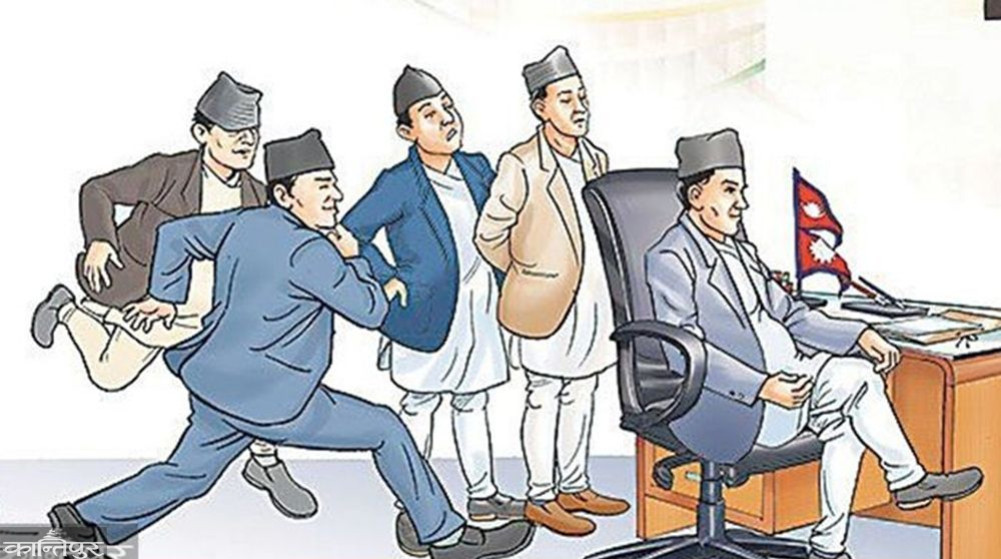Although the economy is slack, it is not in crisis
We use Google Cloud Translation Services. Google requires we provide the following disclaimer relating to use of this service:
This service may contain translations powered by Google. Google disclaims all warranties related to the translations, expressed or implied, including any warranties of accuracy, reliability, and any implied warranties of merchantability, fitness for a particular purpose, and noninfringement.


Even in our statements, the economy is lax. It is no longer difficult to say that the economy is lax. Recently, the morale of businessmen is weak. Businessmen have lost confidence. However, some people are saying that the economy is in crisis. Although the economy is slack, the economy as a whole is not in crisis. Some sectors of the economy are in crisis, some sectors have problems. Looking at the overall economic situation, it is not bad.



Rashtra Bank's 9-month data Looking at it, the country has foreign exchange reserves of 19 trillion 11 billion rupees. The country has enough foreign exchange to cover the import of goods for 15 months and the import of goods and services for 12.5 months. The exterior is strong. We have reached a situation where we can spend foreign currency whenever we need. Our financial system has been breaking through any difficulties. Therefore, when the government brings a program to get a better economic growth rate tomorrow, the private sector now has enough liquidity than the private sector will do. So we can use it anytime as needed.
The prices directly connected to people's homes are also decreasing. According to the 9-month data of National Bank, inflation has dropped to 4.61 percent. If inflation was high, we would have to adopt a strict policy. But that's not the case. Our policies are becoming easier in these various ways. If we compare with the policy of two years ago, today the policy rate has decreased by 2 percentage points. The interest rate of banks has also decreased by 2 and a half percent. Despite this, it has had a direct impact on the construction sector, cement, brick, steel and other related industries. The product is negative. Due to cooperatives and other reasons, there is laxity among the businessmen.
Rashtra Bank's role in slowing down the economy is zero. The policies of some sectors should be stable. But the policy taken by the National Bank needs to be predictable rather than static. The policy rate is not stable in any country. For example, if inflation exceeds 2 and a half percent like Argentina's current situation, monitoring will naturally be stricter, and the policy rate should be increased. If the inflation becomes negative like in China and Thailand, the surveillance will be lax. The policy rate will decrease. National Bank's policy should be predictable that the policy rate will increase when inflation increases and decrease when it decreases.
There are accusations that the economy is lax due to the monetary policy of the National Bank. But the National Bank and monetary policy have no role in the economic slowdown. In Nepal, there is a tendency to blame others when they are in trouble. They are criticizing the National Bank because of the practice of blaming others for their lack of preparation. Nepal Rastra Bank's policy is how to stabilize the economy as a whole, how to reduce inflation, how to stabilize banks and financial institutions, and how to protect the external sector. As a result of monetary policy, our external sector is safe today. Those who have gone abroad, sent remittances, etc., have become strong in the external sector for various reasons.
We have given an interest rate of 1 percent to officially bring in remittances sent from abroad. 41 remittance companies have been opened to receive remittances through financial institutions. We are encouraging all banks and financial institutions to formally introduce remittances.
Some, including real estate businessmen, have spread rumors that the business has closed down due to the strict policies of the Rashtra Bank. Due to the lack of liquidity in the market under pressure, the National Bank has sent 93 billion rupees to the market for liquidity management in one year. The National Bank has also been working to keep the market smooth. National Bank brings policies for the sustainability of inflation in the working sector, external sector, financial sector. The policy brought by the National Bank does not disagree with the Ministry of Finance. It is not a matter of negotiation. If there is an agreement, it will have a big impact in the long run. That is why the National Bank has been cautiously adopting a proactive policy. Public spending should be increased to keep the sluggish economy running. Among the public expenditure, capital expenditure is to be increased. Increasing capital expenditure creates jobs. Capital is formed. The activity of the construction sector increases. As the economic activity increases, the economy becomes viable. There has been a lot of improvement in the external sector through the monetary policy to create an environment for that. Foreign exchange reserves are there, banks have liquidity, inflation is normal.
Every year, Nepal Rastra Bank has been giving suggestions on the budget for the next financial year. Suggestions have also been made for the next financial year's budget. Whether the economy is relaxed or not, the National Bank gives suggestions. Infrastructure, revenue, expenditure, banking and financial matters should be coordinated and brought into the budget statement. In order to improve the investment environment, 8 laws have been amended overnight, incorporating the suggestions of the private sector. There are ups and downs in the economy. But we must remain hopeful.
should move forward by breaking through those ups and downs. Recently, there has been a decrease in demand and a structural change in spending. Small shops have been displaced due to concepts such as online shopping and supermarkets. The problems in cooperatives that are directly connected with small shops, small and medium enterprises have also had a direct impact. However, it is not unsolvable.
Rastra Bank will facilitate through policy. It will be easier for us if the policies for the economy as a whole are raised as inappropriate or wrong. We cannot agree that the policy brought by technical analysis is wrong. Many complained when the policy rate was increased. While the policy rate was increasing by 150 percent in our country, it was increasing by four times in other countries. The situation will bring. Strict policies will be introduced to control inflation. By taking policy according to the situation, the external sector will be protected, stability will be maintained and the banking system will be protected. There was ease after covid, soon after the increase in imports, the external sector came under pressure. It happens anytime. Being an import-oriented country, such challenges remain. Our production does not replace imports. Now we are saying that the entire economy should be restructured. Import-oriented economy, import-based consumption, import-based revenue should be made production-based and internalized. Only then will concrete and sustainable change take place. Otherwise, this challenge will always remain.
is now sufficiently fluid. But just because you have money, you cannot share it. If there is no legitimate project, if there is no right credit demand, if there is no customer, then the money cannot be shared because it is too much. When a legitimate project comes, there is no situation of not getting a loan. The government has set a target of generating 28,000 megawatts of electricity in 12 years. The 4/5 trillion liquidity or resources we have to meet those goals is nothing. Apart from this, we need more resources. When people come to the field, projects come to the field. Liquidity is gradually spent and money is used up.
If we seek to commercialize agriculture and produce agricultural products to replace our imports, 3.5 trillion will be saved annually. But a big investment is required. Insurance for investment, security comes, this mechanism is broken somewhere! We should make such mechanisms. It should not be allowed to create a situation where a loan cannot be given due to lack of insurance, and a legitimate project cannot come up due to lack of loan. National Bank has paid attention to this. Banks are capable for investment, banks have investable liquidity, if there are some limitations, the National Bank is trying to remove them. But the loan demand should be justified. The National Bank does not give loans to pay interest or installments. It doesn't even lead in the right direction. We are on the road to reform. The reform may have had an impact.
The pre-Covid policy rate is not applicable now. Before Covid, when liquidity was under pressure, 93 billion rupees were sent to the market in one year to keep the market running. Now the bank has plenty of money. There is no need to send it to the market. At that time we had given refinance facilities, but now it has no meaning. The bank is ready to give loan at the rate at which we give refinance. While refinancing at 6 and a half and 3 percent to a total of 9 and a half percent, the bank is giving loans at the same rate. So there is no need to take refinance from Rasht Bank. We do not have any obstacles to not give loans. The main reason for not giving loans is market and demand. A bank can invest 25 percent of its total investment in real estate. The loan to value ratio for individuals is increasing. Every field has such limits. The bank has enough space and liquidity to invest.
Currently, the capacity utilization of a cement industry is 40 percent. If it had been operating at 100 percent capacity, there would have been a need for functional capital accordingly. Loans were also taken on the same basis. There is no need to take a loan and keep stock or pay interest. Businessmen also take loans according to their needs. That is why the demand is decreasing. Some chaotic people are going around saying that they will not pay the bank loan, they will waive it. The bank employees are being blackmailed. In such an environment, banks and financial institutions are also reluctant to give more loans if the loans taken earlier have not been repaid. Due to various factors, there is a problem in disbursing loans in the correct way. It needs to be improved. We are coordinating with government agencies for improvement.
After Corona, 20 billion loans have been blacklisted or other loans have not been recovered. The number of blacklisted people has increased not only due to non-payment of loans but also due to bounce of most of the checks. This does not mean that all loans will not be incurred. Most of the money is raised.
Rashtra Bank has been promoting digital banking as a campaign for the past 3 years. 24 million people in the country ie 73 percent are using mobile banking. This is a very big achievement. An agreement has been reached between Nepal Clearing House (NCHS) and National Payments Corporation of India (NPCI) for international electronic payments. A memorandum of understanding has also been signed with Nepal Rastra Bank and Central Bank of India to facilitate this. The bank is working as planned. Phonepay has also managed with India's NPCI.
Nepal Rastra Bank includes all licensed operators in the international payment system. The National Bank has issued a 'Consultative Paper' for that. The deadline is coming to an end on May 5. The general public, concerned agencies and others have been sent for feedback. There is a provision for two-way inquiry and issue in international payments. After the finalization of the consultative paper, we will issue a circular to all the service providers who have taken the license based on it. Now 10,000 per day when withdrawing from the card, there is any arrangement to pay the hospital. So far, no limit has been set for electronic transactions. We are also preparing to set limits for electronic transactions. All provision After coming, everyone will be able to do electronic transactions. It doesn't mean that only NCHL will get it, Phonepay won't get it. The National Bank has invested in NCHL because of the government's low investment in digital infrastructure. Rashtra Bank's 10 percent investment is only for infrastructure. It does not mean that only the company invested in should do business without allowing other companies to do business. Everyone can do business.
 प्रकाशित : जेष्ठ ३, २०८१ २१:२३
प्रकाशित : जेष्ठ ३, २०८१ २१:२३

 २१.१२°C काठमाडौं
२१.१२°C काठमाडौं
















